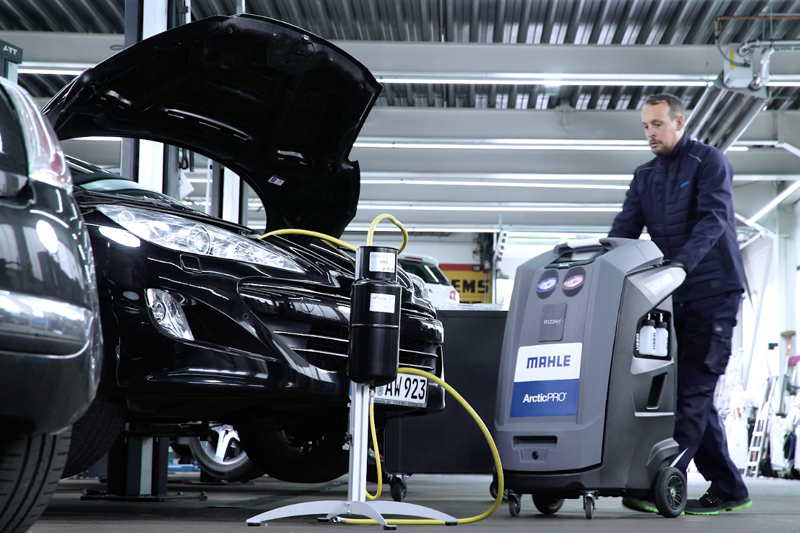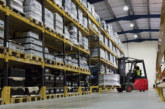MAHLE expects thermal management demand increase

MAHLE Aftermarket is urging factors to think ahead and prepare for increased demand of thermal management in spring.
As the aftermarket begins to welcome more EV vehicle options, the air conditioning (A/C) system is becoming an all-year requirement, particularly as we head towards the warmer weather, meaning replacement of even the simplest product, or ignoring its replacement, can have a major effect on a customer’s pocket and health, says Alan Povey, quality, warranty, and technical representative at MAHLE Aftermarket.
The company is an OEM in automotive air conditioning and engine cooling, which is reflected in thermal management making up a third of MAHLE’s product range. With 3,421 references in total, customers have access to the most in-demand, OE-quality products so they can offer professional maintenance and efficient replacement.
Due to the growing importance of e-mobility, MAHLE’s range covers various components for hybrid and electric vehicles, with 501 SKUs for more than 1,000 applications.
Here, Povey discusses the core products within the thermal management range, offering technical advice on fitment and replacement.
Cabin Filters
Let’s start with the simplest of components: the cabin filter, which can often be bypassed. MAHLE cabin air filters supply the driver and passengers with clean air to breathe, which safeguards their health and well-being.
They are also said to reduce the load on the blower, protect heating and air conditioning from contamination, improve air circulation and prevent dangerous fogging of the windows.
In addition, the company claims the inside of the windows and fittings remain cleaner for longer. The pleat geometry of MAHLE‘s cabin air filter elements is designed to provide a long service life. The low flow resistance is said to minimise the load on the blowers and thanks to the accurate fit of the filter elements in the housings, bypass air is prevented.
MAHLE recommends changing the cabin air filter every 15,000 km or a minimum of at least once per year. If the cabin air filter fails or is clogged, the pollutant concentration in the interior of the vehicle can apparently increase to six times of that of the outside air.
Evaporators
MAHLE‘s flat tube evaporators deliver high performance in spite of their compact and lightweight design. The company‘s patented BehrOxal® coating technology modifies the aluminium surface such that it assumes hydrophilic properties. As a result, water runs off more easily, enabling the evaporator to dry more quickly. This claims to make the evaporator more resistant to corrosion and less prone to unpleasant odours.
Compressors
Today’s fuel-efficient engines do not always deliver sufficient waste heat to enable rapid heating of the vehicle cabin, particularly for cold starts and in certain driving conditions. To keep the windows clear and ensure optimum thermal comfort in these situations, additional heating is provided by electric PTC auxiliary heaters that run on energy from the vehicle electronics. The heaters are available with or without an integrated controller.
Featuring the next generation of variable displacement piston compressor technology, MAHLE’s Compact Variable Compressors (CVC) are based on a swash plate simple harmonic motion mechanism. It’s said that the enhanced mechanism performance makes the CVC adaptable to both pneumatic and electronic control.
Blowers
Thermal and acoustic comfort is crucial in vehicle air conditioning. However, the blower is one of the main sources of noise in the vehicle cabin. MAHLE‘s current blower design concepts claim to meet three separate requirements: they save valuable package space despite increased air flow performance, they are highly efficient, and they form the basis for excellent HVAC system acoustics.
Condensers
MAHLE produces brazed, flat tube condensers that deliver high performance despite their compact and lightweight design. It’s said they ensure rapid cooling of the passenger compartment thanks to optimum matching of heat transfer and pressure drop on both the coolant and the air side.
Radiator
Designed to transfer heat created by the engine, cool down the coolant and maintain an engine at a constant temperature, the design and construction of radiators has changed from the older tube construction to an aluminium brazed unit which is lighter and for the same size unit an improved cooling capacity.
The most important component of a cooling module is the coolant cooler, according to MAHLE. It consists of radiator block and coolant boxes with all necessary connections and fasteners. The radiator block is usually made of aluminum and the coolant boxes are either made of glass fibre reinforced plastic or also made of aluminum. Modern Radiator construction where the coolant tubes and cooling fins are brazed together, results in improved heat transfer.
Thermostats and valves
The diverse tasks of engine cooling can only be realised by intelligent control of the resulting energy flows. For example, different systems and engine components must be supplied with coolant as required – in modern systems even at different temperature levels and in different cooling circuits.
Control systems from MAHLE, such as dual thermostats, reportedly ensure demand-based, precise temperature control and thus more efficient operation, reduced consumption, less wear, and reduced emissions.








